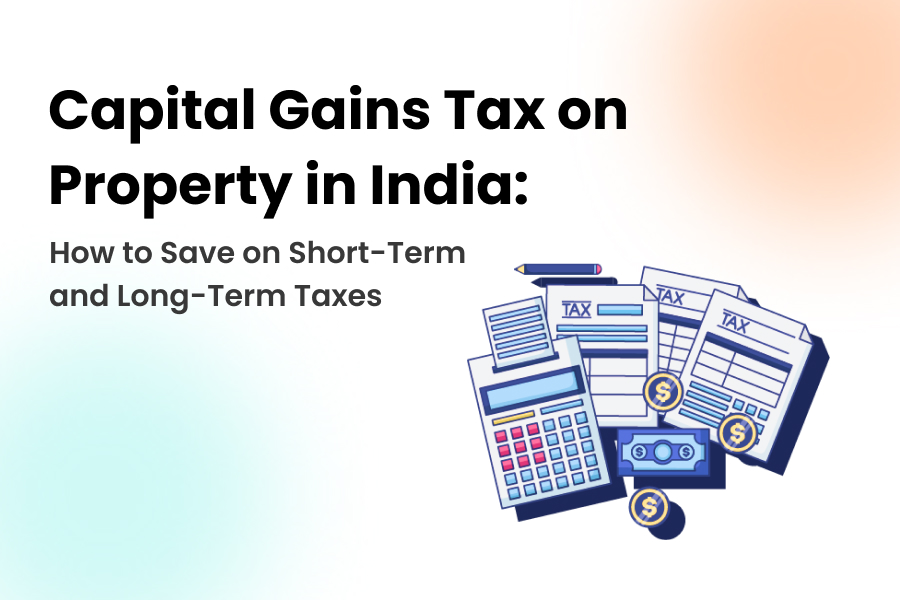Capital gain is tax-free under certain conditions and subject to specific guidelines. Currently, long-term capital gain on property sales is taxed at a flat rate of 20%, with indexation benefits available or at 12.5% without indexation benefits.

Selling property in India can be rewarding, but it also triggers a tax liability known as capital gains tax on property. Whether it’s a house, plot, or inherited asset, profits from the sale are taxable under the Income Tax Act. The amount of tax depends on how long you’ve owned the property, and there are legitimate ways to reduce or even avoid it.
Understanding the rules around short term capital gains tax on property, long term capital gains tax on property, exemptions, and indexation can help you keep more of your earnings while staying compliant.
Capital gains are categorised based on the holding period of the property:
A capital gains tax calculator on sale of property can help you estimate the liability. The basic formula is:
Sale Price – (Indexed Purchase Price + Transfer Expenses + Cost of Improvement) = Taxable Capital Gains
For ltcg tax on property, indexation significantly lowers your taxable profit, while for short term capital gains tax on property, the entire gain is taxed without adjustment for inflation.
If you’re wondering how to save capital gains tax, the Income Tax Act provides multiple options:
Legally, you can avoid capital gains tax on property by:
Trying to evade tax without meeting these legal conditions can lead to penalties, so always follow the prescribed process.
With Pune’s real estate market seeing steady growth, averaging ~8-10% annual price appreciation in prime corridors, selling property can mean significant gains. For example, upcoming projects by real estate developers in Pune in areas like Punawale, Hinjawadi, and Wakad have drawn investor interest, leading to higher transactions and more capital gains events.
Capital gains tax is a key factor in real estate transactions. Knowing whether your sale attracts short term capital gains tax on property or long term capital gains tax on property, and being aware of exemptions like section 54 capital gains or exemption under section 54EC, can help you reduce your liability.
If you’re looking to reinvest your gains smartly, Pharande Spaces offers projects like Puneville, ideal for buyers seeking 2 BHK flats in Punawale or larger configurations. Working with reputed real estate developers in Pune ensures your investment aligns with your lifestyle while optimising your tax benefits.
Capital gain is tax-free under certain conditions and subject to specific guidelines. Currently, long-term capital gain on property sales is taxed at a flat rate of 20%, with indexation benefits available or at 12.5% without indexation benefits.
Capital gains tax is calculated by subtracting the indexed purchase price, transfer expenses, and cost of improvement from the sale price. For long-term capital gains, indexation helps reduce taxable gains by adjusting for inflation.
The capital gains tax rate for long-term property sales remains at 20% with indexation benefits. If the property is held for more than 24 months, the sale is subject to long-term capital gains tax. This tax is more tax-efficient compared to short-term gains.
The maximum capital gains tax on property depends on the applicable rate for long-term capital gains, which is 20%. For short-term capital gains, the tax rate matches your income tax slab.
You can save capital gains tax from the sale by reinvesting in another residential property under Section 54 or by investing in bonds under Section 54EC. These exemptions can reduce or even eliminate your capital gains tax liability.
Capital gain can be tax-free if it qualifies for exemptions under provisions like Section 54 (reinvestment in residential property) or Section 54EC (investment in specified bonds). The exemptions are applicable provided the conditions are met.
Capital gains on inherited property are not immediately taxable, but when sold, capital gains tax applies based on the original owner’s purchase cost and indexed acquisition year.
Yes, capital gain is taxable income. It is subject to tax depending on whether it is classified as short-term or long-term based on the holding period of the property.
To avoid short-term capital gains tax on property in India, you would need to hold the property for more than 24 months. This shifts the gain from short-term to long-term, which is taxed at a lower rate and benefits from indexation.
Short-term capital gain can be minimized by holding the property for more than 24 months. This converts it into long-term capital gain, which has a lower tax rate and offers indexation benefits.